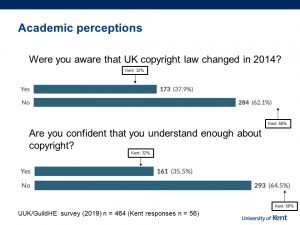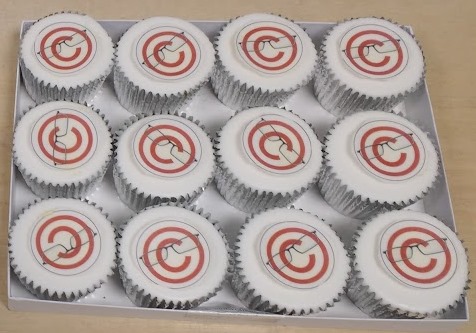The University of Kent Copyright Literacy Strategy
Last week (23 May 2019) we held the first workshop towards creating a copyright literacy strategy at the University of Kent. This project builds on the work we did a few years ago to embed copyright literacy within Information Services. It incorporates the latest thinking and activity around copyright literacy which I have been working on with Jane Secker and others, and reporting on at copyrightliteracy.org. As before I will be using this blog to report on developments as the project progresses.
The Team
In order to do this work I have been lucky enough to assemble a really strong team of people to help develop the strategy:
- Prof Paul Allain – Dean of the Graduate School
- Matt Arter – Software Licensing & Policy Coordinator, Information Services
- Dr Jose Bellido – Senior Lecturer in Law, Kent Law School
- Ania Bobrowicz – Senior Lecturer in Digital Arts, School of Engineering & Digital Arts
- Dr Helen Brooks – Reader in Theatre & Cultural History, Director of Research & Director of UG Drama, School of Arts
- Dan Clark – University Learning Technologist, Curriculum Development Team
- Dr Marcus Goodall – Technology Transfer Manager, Kent Innovation & Enterprise
- Dr Richard Misek – Senior Lecturer, School of Arts
- Dr Julia Hope – Lecturer in Higher Education and Academic Practice, Academic Practice Team
- Dr Gary Robinson – Senior Lecturer in Microbial Biotechnology / Senior Commercialisation Manager, School of Biosciences
- Justine Rush – Head of Academic Liaison, Information Services
- Sarah Slowe – Head of Scholarly Communication, Information Services
- Ben Watson – Accessible Information Adviser, Student Support & Wellbeing
- Matt Wilson – Digital Imaging Team Leader, Information Services
- Gill Woodhams – Assistant Director Planning & Administration, Information Services (project sponsor)
We got good attendance at the first session, with representation for the majority of the areas affected by copyright. Thanks to the Information Services project management group who approved the budget for cookies which went down very well.
Mapping the landscape

I used some slides to lead the group through the workshop, set the scene and make the links between copyright literacy research (including my own MA research) and the situation at Kent. It was interesting to reflect that academic awareness of copyright appears to be lower at Kent than at other institutions according to research conducted by the UUK/GuildHE Copyright Negotiation and Advisory Committe (CNAC) earlier this year. This suggests that a more coordinated approach to copyright literacy here would be very helpful.
The first exercise we did looked at the types of activity at the university which are affected by copyright. Participants came up with a long list of these including the following:
- Use of third party copyright materials in teaching
- Lecture recording
- Publishing/sharing works where the copyright status of the work is unknown (i.e. no known date of death)
- Use of social media
- Creation of open educational resources
- Photography at the University and links with privacy and personal data (i.e. what level of consent is required)
- Public performance of music/films/dramatic works
- Inclusion of copyright material in MOOCs
- Creation of software, databases, questionnaires, financial tools and algorithms
- Providing accessible materials and the challenge of technical protection measures (TPMs)
We then moved on to the second exercise which was to list out the behaviours we observed at the University, the desired behaviours which we would like to see and the steps we might take to move from one to the other. I was keen to frame this discussion not just in terms of compliance, but thinking about the bigger picture of what the University’s mission is and ensuring that copyright is not a barrier to this. We did capture the fact that some may be (inadvertently or not) infringing copyright. However, we also identified a considerable risk that a lack of confidence may be leading some to self-censorship and an overly cautious approach. This principle spread across a range of activities including teaching using digital technologies, dissemination of research under various funding policies and public engagement through activities such as exhibitions.
Policy and Strategy
The final part of the workshop involved looking at our existing copyright policy and working out what we should keep and what we should change, as well as scoping out what the copyright literacy strategy might look like. This was a really valuable conversation which I will write about in more detail as the project develops. However, I was pleased to find that the group was supportive of explicitly advocating for responsible use of copyright exceptions, which is one of the main reasons for undertaking the project. The group is also aware of the sensitivities involved in open vs closed licensing of copyright on materials created at the University and made a good start on identifying areas to consider. Ultimately all agreed that raising awareness of copyright and promoting copyright literacy at the institution was a worthwhile undertaking which I certainly thought was a good outcome.
Next Steps
I look forward to sharing more as this project develops and I was very pleased that the working group supported my suggestion to share the outputs of the workshop in a spirit of openness. I will therefore add updates on this blog as and when they happen, reporting either on workshops and meetings or particular areas of interest or case studies. I also hope to entice some of my colleagues to contribute some blog posts as Helen Brooks did a few weeks’ ago so watch this space.
Thanks for reading if you’ve made it this far. Please do send any suggestions, comments or questions about what we’re doing at Kent and I will look to incorporate these into the project as it develops.


Thanks Lesley, I’m looking forward to reporting on progress.
Chris, great to see you sharing your copyright literacy initiatives. I’m sure this will help others with their copyright literacy efforts.